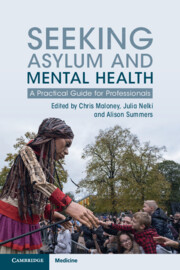Book contents
- Seeking Asylum and Mental Health
- Seeking Asylum and Mental Health
- Copyright page
- Contents
- The Authors
- Foreword
- Acknowledgements
- Glossary
- Introduction
- 1 Why do people seek asylum? The global context
- 2 Seeking asylum in the United Kingdom
- 3 Seeking asylum and mental health
- 4 Access to mental health care
- 5 Assessing mental health needs
- 6 Interpreting assessment findings
- 7 Formulation and diagnosis
- 8 Common diagnoses
- 9 Intervention: the essentials
- 10 Specific interventions
- 11 Children, families, and young people
- 12 Records and reports
- 13 Improving mental health services
- 14 Therapeutic complexity
- 15 Working with people seeking asylum
- Some resources
- Index
- References
12 - Records and reports
Published online by Cambridge University Press: 26 August 2022
- Seeking Asylum and Mental Health
- Seeking Asylum and Mental Health
- Copyright page
- Contents
- The Authors
- Foreword
- Acknowledgements
- Glossary
- Introduction
- 1 Why do people seek asylum? The global context
- 2 Seeking asylum in the United Kingdom
- 3 Seeking asylum and mental health
- 4 Access to mental health care
- 5 Assessing mental health needs
- 6 Interpreting assessment findings
- 7 Formulation and diagnosis
- 8 Common diagnoses
- 9 Intervention: the essentials
- 10 Specific interventions
- 11 Children, families, and young people
- 12 Records and reports
- 13 Improving mental health services
- 14 Therapeutic complexity
- 15 Working with people seeking asylum
- Some resources
- Index
- References
Summary
Details in written material may be used to challenge or support a person’s asylum case, usually relating to credibility. There may be intense scrutiny of clinical material by people without clinical training. Writing records, letters and reports for people seeking asylum requires careful attention to confidentiality and consent, use of impartial, precise language and distinguishing direct quotes from opinion and summary. Clinicians should record any disclosure of scars of physical injury even if they cannot conduct a physical examination. Records and letters may contain imprecision, uncertainty and errors and may be misinterpreted or given undue weight. Before releasing records, clinicians need to ensure consent is up-to-date and adequately informed, and to add a caveat about the limitations of such records. Clinicians may prepare letters or reports for use in legal proceedings acting in an everyday clinical role (as a professional witness) or as an expert witness.They may be asked to address issues such as: causation; reporting requirements; fitness to give evidence; capacity; vulnerable adult status; asylum support; fitness to fly; age dispute; fitness to fly; trafficking.
Keywords
- Type
- Chapter
- Information
- Seeking Asylum and Mental HealthA Practical Guide for Professionals, pp. 230 - 252Publisher: Cambridge University PressPrint publication year: 2022



